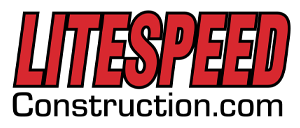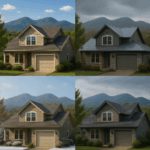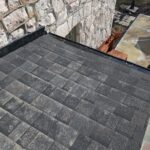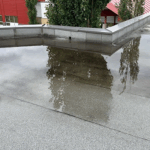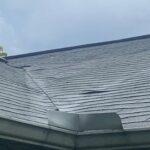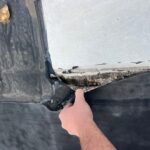Can You Install Metal Roofs on Flat Roofs?
When considering durable and energy-efficient roofing solutions, metal roofs have become a top choice for many property owners.
However, the suitability of metal roofing for flat roofs remains a common question.
In this comprehensive guide, we’ll explore whether metal roofs can be installed on flat roofs, the benefits, challenges, and costs associated with the process, and why this solution could be ideal for Asheville, NC property owners.
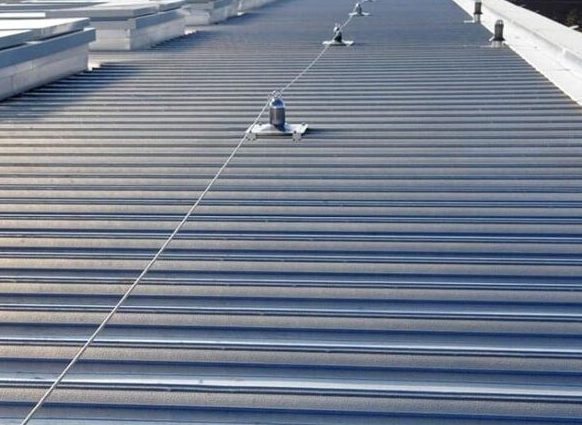
Compatibility of Metal Roofs with Flat Roofs
Metal roofing, traditionally used for pitched roofs, is increasingly being considered for flat or low-slope roofs. Flat roofs, defined as having a slope of 1:12 to 3:12, can accommodate metal roofing with specific designs and techniques. While standing seam metal roofs are most popular for steep-slope applications, flat roofs often require modified systems such as flat-seam panels or custom corrugated sheets to ensure proper drainage and structural integrity.
According to the U.S. Department of Energy, the reflective properties of metal make it one of the most energy-efficient materials for all types of roofs, including flat ones. Proper installation is crucial to prevent ponding water—a common challenge with flat roofs—that can lead to leaks and corrosion.
Advantages of Installing Metal Roofs on Flat Roofs
1. Longevity
Metal roofs are renowned for their exceptional lifespan, outlasting traditional flat roofing materials such as asphalt or rubber. While traditional flat roofs typically need replacement every 10–20 years, metal roofs offer an impressive lifespan of 40–70 years, providing peace of mind and cost savings over time. The longevity of metal roofs is attributed to their resistance to common roofing issues such as rot, cracking, and warping. Additionally, Asheville homeowners and business owners can benefit from fewer maintenance costs over the decades, making it a wise long-term investment.
2. Energy Efficiency
Metal roofing systems are engineered to reflect solar radiation, keeping buildings cooler during Asheville’s hot summer months. This reflective quality reduces energy costs by up to 25%, as reported by the U.S. Department of Energy. In a region like Asheville, where summers can be humid and winters chilly, the energy efficiency of metal roofs ensures year-round savings. By reducing the demand for air conditioning and heating, property owners can also decrease their environmental footprint. For maximum energy efficiency, options like cool roof coatings or light-colored metal panels can further enhance reflectivity and insulation.
3. Durability
Durability is one of the strongest selling points of metal roofs. Built to withstand harsh weather conditions, they perform exceptionally well under fire, heavy rain, snow, and wind. Asheville’s seasonal weather includes both summer storms and winter snowfalls, making durability a key consideration for local property owners. Many metal roofing systems are rated to resist wind speeds of up to 140 mph, which is crucial in regions that occasionally experience severe storms. Furthermore, metal roofs are not susceptible to mold or insect damage, issues that commonly plague traditional roofing materials.
4. Environmental Benefits
Sustainability is becoming an important factor in construction decisions, and metal roofs deliver in this area. Most metal roofs are made from 25–95% recycled materials, and they are 100% recyclable at the end of their life. In comparison, many conventional flat roofing materials, such as asphalt, contribute to landfill waste and are not recyclable. Opting for metal roofing not only supports sustainability but also aligns with Asheville’s eco-conscious culture. Additionally, metal roofs can be fitted with solar panels more easily than other materials, further enhancing their environmental value.
5. Aesthetic Appeal
Gone are the days when metal roofs were only associated with industrial buildings. Today, metal roofs are available in a variety of colors, textures, and styles, allowing property owners to match the roof to their building’s architectural design. Whether it’s a sleek, modern commercial property or a historic home in Asheville’s charming neighborhoods, metal roofs can complement and even elevate the aesthetic appeal of the structure. Options such as standing seam panels or corrugated designs provide flexibility in design while maintaining the functional benefits of metal roofing. Many manufacturers also offer finishes that mimic the appearance of slate, tile, or wood, making metal roofs a versatile choice for different architectural styles.
The combination of longevity, energy efficiency, durability, environmental friendliness, and aesthetic versatility makes metal roofs an excellent choice for flat roof applications in Asheville and beyond. These benefits not only enhance the value and appearance of the property but also contribute to long-term savings and sustainability.
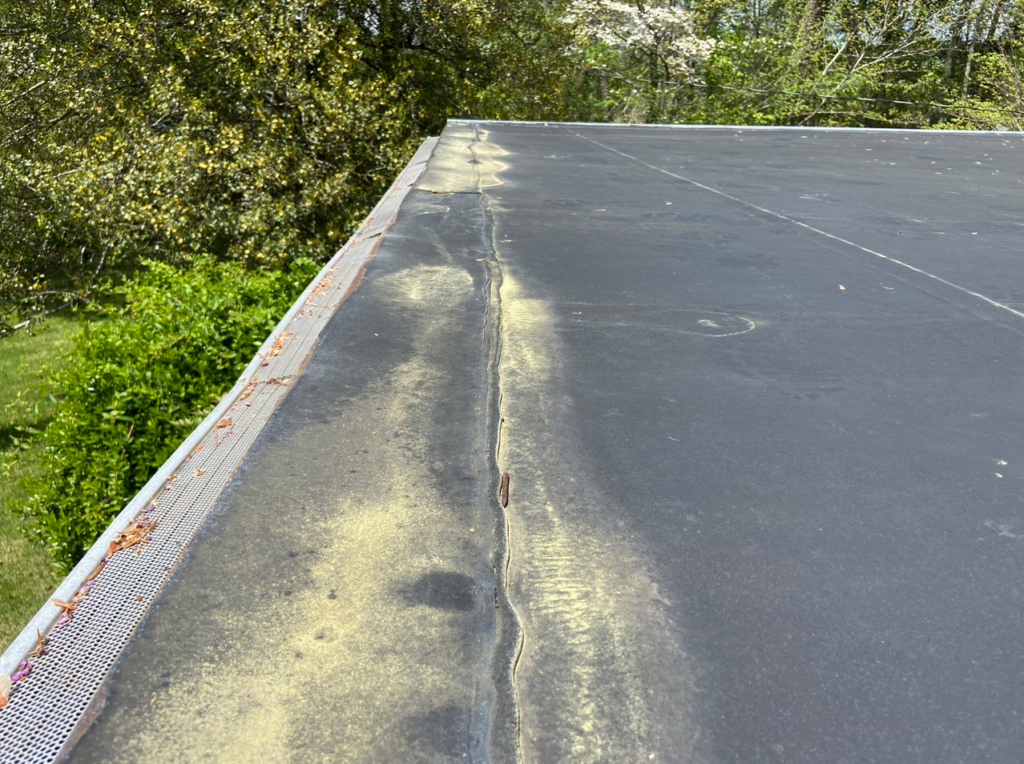
Challenges of Installing Metal Roofs on Flat Roofs
While the benefits are compelling, there are considerations to keep in mind:
Drainage
Flat roofs are prone to water pooling. Installing a metal roof requires designing a slight slope or incorporating drainage systems to prevent water-related damage.
Higher Initial Cost
The cost of installing a metal roof on a flat roof is typically $10–$20 per square foot, higher than traditional flat roofing materials. However, the long lifespan and energy savings often offset this expense.
Insulation Requirements
Metal is a conductor of heat and cold. Proper insulation layers are necessary to maintain energy efficiency and prevent condensation.
Professional Expertise Needed
Flat roofs with metal require specialized installation techniques, making it essential to hire experienced professionals like those at Asheville’s top roofing companies.
Why Asheville Property Owners Should Consider Metal Roofs for Flat Roofs
Asheville’s roofing needs are shaped by the city’s diverse climate. From heavy snowfall in the winter to the sun-soaked summers, a metal roof can provide consistent performance. Metal roofing is particularly appealing for businesses in Asheville, where energy efficiency and aesthetic harmony with the city’s architecture are critical.
Moreover, choosing a local roofing company ensures the expertise required for a successful installation. Local professionals understand Asheville’s building codes, weather patterns, and community aesthetic values, providing a tailored roofing solution.
Pros and Cons of Installing Metal Roofs on Flat Roofs
| Pros | Cons |
|---|---|
| Long lifespan (40–70 years) | Higher upfront costs |
| Energy efficiency reduces cooling bills | Requires professional expertise |
| Resistance to fire, wind, and weather | Potential for noise during heavy rain |
| Environmentally friendly and recyclable | Custom drainage solutions needed |
Case Study: Successful Metal Roofing on a Flat Roof in Asheville
In Asheville, where architectural beauty meets the challenges of a varied climate, one local business owner made a transformative decision to upgrade their aging rubber flat roof to a standing seam metal roof. The building, a 3,000-square-foot commercial space located in downtown Asheville, was experiencing frequent leaks, escalating maintenance costs, and increasing energy bills due to the inefficiency of the old roofing material.
The Problem
The existing rubber roof had been in place for nearly 15 years, showing visible signs of wear and tear. Regular patchwork repairs were no longer sufficient to address recurring leaks, which disrupted business operations during heavy rain. Additionally, the outdated roof offered poor insulation, causing excessive heating and cooling costs—an issue exacerbated by Asheville’s warm summers and chilly winters.
The Solution: Transitioning to a Metal Roof
After consulting with a local roofing company specializing in metal roofs for flat roof applications, the business owner opted for a standing seam metal roof. This type of metal roofing was selected for its sleek design, high durability, and exceptional performance on flat roofs when combined with proper drainage solutions. The project involved several key steps:
1. Inspection and Assessment:
Roofing professionals evaluated the structural integrity of the building and ensured that the flat roof could support the weight of the metal panels.
2. Removal of the Old Roof:
The existing rubber roof was carefully removed to expose the underlying decking, which required minor repairs to address areas weakened by water damage.
3. Installation of Underlayment:
To enhance water resistance and prevent condensation, a high-quality waterproof underlayment was installed. This step is crucial for flat roofs to manage drainage and thermal efficiency effectively.
4. Metal Panel Installation:
Standing seam panels were custom-fabricated to fit the roof’s dimensions, ensuring a seamless finish. The interlocking design of the panels provided added protection against water infiltration and wind uplift.
The Results: A Durable, Energy-Efficient Roof
The completed project cost approximately $35,000, which included the removal of the old roof, installation of the new standing seam metal roof, and integration of a custom drainage system to prevent ponding water. The investment delivered significant benefits within the first year:
1. Reduced Energy Bills:
The building experienced a 30% reduction in energy costs, thanks to the reflective properties of the metal roof and its ability to maintain a consistent indoor temperature.
2. Minimal Maintenance Costs:
Unlike the rubber roof, which required frequent repairs, the metal roof proved to be virtually maintenance-free. The standing seam design ensured water resistance, while the durable metal panels withstood Asheville’s diverse weather conditions.
3. Improved Aesthetics:
The sleek, modern appearance of the standing seam panels gave the building a fresh, updated look that complemented the surrounding architecture in Asheville’s vibrant downtown area.
4. Longevity and Value:
With an estimated lifespan of 50+ years, the new metal roof eliminated the need for another replacement in the foreseeable future, offering substantial savings over time.
Lessons Learned
This case study underscores the importance of selecting a roofing material that balances durability, energy efficiency, and aesthetic appeal. The success of this project demonstrates that, when installed correctly by experienced professionals, metal roofs can outperform traditional flat roofing systems in all key metrics. For Asheville business owners facing similar challenges, upgrading to a metal roof can be a game-changing solution that delivers both immediate and long-term benefits.
If you’re considering a roofing upgrade for your flat roof, this example shows how the right choice can enhance your property’s performance and value while contributing to a more sustainable future.
FAQs About Metal Roofs and Flat Roofs
Yes, with proper underlayment and drainage systems to ensure longevity.
The initial cost is higher, but the durability and energy savings justify the investment.
With proper installation, they can last 40–70 years.
Yes, they are designed to withstand significant snow loads, making them ideal for Asheville winters.
They need periodic inspections but require less maintenance than other materials.
Energy-efficient metal roofs may qualify for federal tax credits.
Aluminum, galvanized steel, and zinc are popular for their durability and weather resistance.
Metal roofs last longer and offer better energy efficiency but cost more upfront.
Yes, they come in various colors and finishes to suit aesthetic preferences.
With proper insulation, the noise is minimal.
Final Thoughts on Metal Roofs for Flat Roofs
The decision to install metal roofs on flat roofs requires careful consideration of costs, installation techniques, and benefits. With their durability, energy efficiency, and aesthetic appeal, metal roofs are an excellent option for flat roofs in Asheville. Collaborating with a trusted local roofing company ensures the project is completed to the highest standards.
If you’re ready to upgrade your flat roof to a durable metal solution, consult an experienced roofing contractor in Asheville, NC to explore your options.
